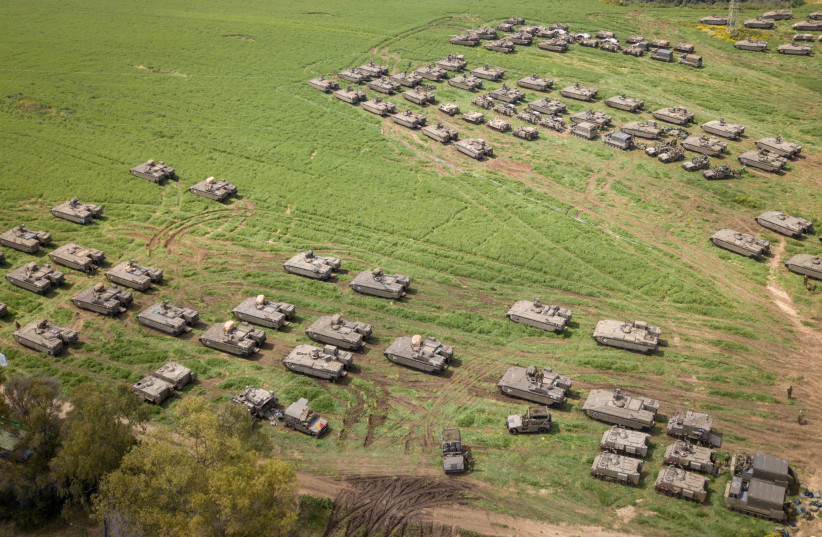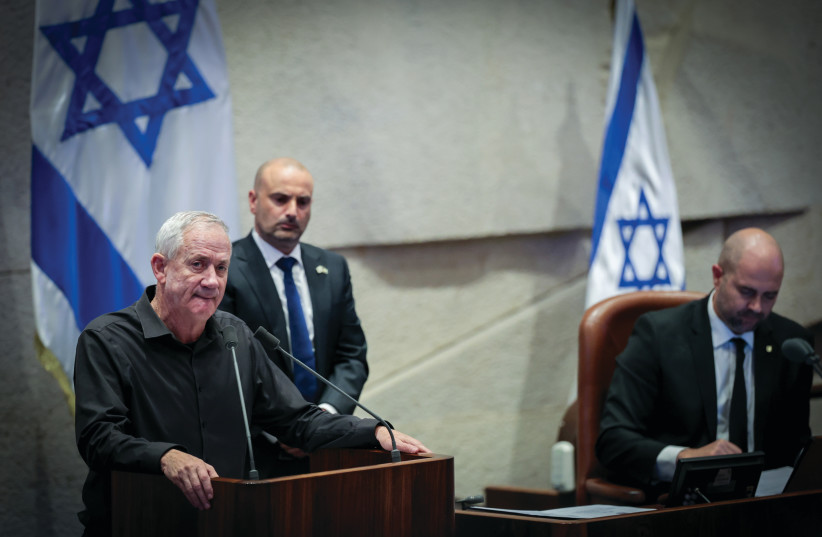National Unity Party leader and war minister Benny Gantz on Thursday gave the most detailed revelations on record from one of Israel’s decision-makers to date regarding the war in Gaza and its aftermath.
Gantz made it clear that the government’s original solitary goal of destroying Hamas and remaking the reality in Gaza has been adjusted by multiple other goals.
If initially top sources told the Jerusalem Post that the invasion of Gaza would happen in the first week and the government wanted to convey a sense of rapid momentum in that direction, Gantz and the government now want to convey a purposeful deliberateness in deciding their grand strategy.
Not only did Gantz join with the current government and defense officials in taking responsibility for the failure to foresee Hamas’ invasion, but, more importantly, he defended the government’s delay of the invasion.
Of course, he did not say those explicit words, but he said that he has been at the center and agrees with all government decisions regarding the war – and the government has refrained for almost three weeks from ordering the counter invasion of Gaza.

In separate messages, the government and IDF said from the start that they wanted to return the hostages as well as eliminate Hamas.
However, in the early days of the war, a senior diplomatic official made it emphatically clear at that time that worrying about the hostages getting in the crossfire would in no way slow down the IDF’s attacks on Hamas.
That indication has ultimately panned out as inaccurate, as the ground invasion has been delayed by weeks and Gantz made it clear that trying to save hostages was not just a tactical issue, but a strategic consideration.
Sources have hinted that Gantz still realizes that destroying Hamas is the primary goal, but the fact that he did not use those words publicly, shows how heavily the fate of the hostages is weighing over him and other key decision-makers as a strategic matter.
Of course, Gantz and all key players in Israel say that Israel will only make decisions based on its own national interests, but he made it clearer than ever that how those interests are viewed at a strategic level is far more through the eyes of top US officials than it was in the first week of the war.
He said that the IDF would greatly increase its attacks soon, but balanced that promise with the need to retain international legitimacy, including deep coordination with the US.
US calls for smaller scale response
The US has been less bashful than Israeli officials, and has explicitly called for a smaller invasion, more along the lines of Israel’s 2014 limited incursion in Gaza, with only a much smaller number of elite troops going deeper into urban areas.
Gantz made it clear that Gaza strategy is massively impacted by concerns about the next moves by Hezbollah and Iran.
One of the practical upshots of that is waiting longer for more US missile defense to be in place to further dissuade Hezbollah from getting involved if and when the IDF finally does its ground invasion into Gaza.
Other sources have revealed that some of the delay is to frame the invasion also around the best way to deal with post-invasion guerilla warfare tactics as well as to be better in a position to completely end weapons smuggling into Gaza.
This could include reconsidering the status of the Philidelphia Corridor which Israel gave control of to Egypt in 2005.
Gantz does not want to discuss with the public exactly when Israel will give up on hostages in order to prosecute the war or when the war will be fought less aggressively to give more opportunities to save hostages.
Top generals have indicated to the Post that the IDF is ready to take some real operational risks to try to rescue as many hostages as possible, while understanding how hard that will be.

It is unclear if Gantz and the government’s belief that the US will continue to back Israel’s right to deeply clean out Hamas even for weeks and months will be correct.
It is further unclear whether Gantz and the government’s belief that Israelis who have evacuated from the North and the South will wait patiently for an extende delay of the invasion to return home or start to protest government policy.
Just before press time, Defense Minister Yoav Gallant similarly blurred the disparate goals of destroying Hamas and rescuing hostages, calling saving hostages a “supreme goal.”
With the lack of clarity, Gantz’s speech and to some extent Gallant’s, has made clearer what has changed and where Israel is going.
